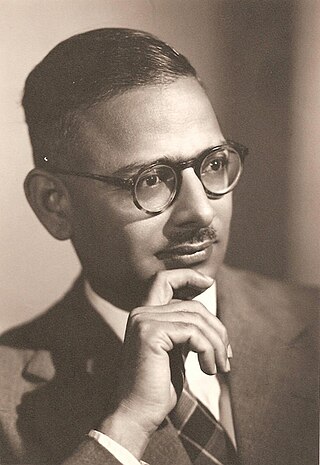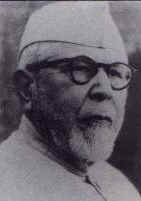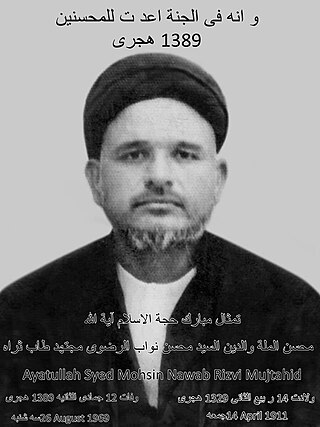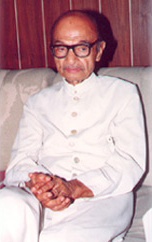| Part of a series on |
| Progressive Writers' Movement |
|---|
Abdul Aleem was a scholar, educationist, journalist and writer in Urdu. He was the professor of Arabic at Aligarh Muslim University, and also served as its vice-chancellor from 1968 to 1974. [1]
| Part of a series on |
| Progressive Writers' Movement |
|---|
Abdul Aleem was a scholar, educationist, journalist and writer in Urdu. He was the professor of Arabic at Aligarh Muslim University, and also served as its vice-chancellor from 1968 to 1974. [1]
He belonged to a zamindar family. His father was a practicing lawyer in Lucknow. He excelled at studies from the very beginning, and it was only natural that he should have been drawn into the field of academics. After his studies he initially joined Jamia University and during his association with Jamia university, he wrote profusely for its organ "Jamia". His escalation as an academic was phenomenal, but hardly surprising in view of his abilities. In the early 1930s he had been to Germany and had there come into contact with Marxian thought. After his stint at Jamia, Abdul Aleem joined the Lucknow University as head of Department of Arabic. He was soon to come under the influence of the progressives. The progressives were extremely active at Lucknow, during this period. The university was a hotbed of nationalist, socialist and communist literary activities. It was no surprise that he should have got involved in these. [2]
In 1934, when Shri Jaiprakash Narian lay the foundation of the Congress Socialist Party at Pune, Abdul Aleem was with him, amongst the founders. When the first convention of the Progressive Writers was being called at Lucknow in 1936, Shri Abdul Aleem was amongst the organisers along with Sajjad Zaheer and others. In 1938, he was appointed General Secretary of this Association. He was managing director of the weekly "Hindustan" which was the precursor of the Qaumi Awaz. this publication was started by Acharya Narendra Dev and shri Rafi Ahmed Qidwai. He was also a member of the editorial board of "New Indian Literature" along with Mulk Raj Anand and Ahmad Ali. His work "Literature and Marxism" is one of the accomplished treatises of the times and of the progressive literature of the period. The writings of Abdul Aleem were causing an awakening amongst the youth, throughout the length and breadth of the entire country and his political activism was becoming more and more strident day by day. As a consequence, he was arrested and imprisoned by the British and underwent rigours of prison for a year.
After independence was won, Abdul Aleem was invited to join the Aligarh Muslim University as head of the Department of Arabic. In a short time he proved his worthiness in his assignment and was appointed as Vice Chancellor, Aligarh Muslim University in 1968. After completing his tenure here he was called upon to serve as chairman of the newly constituted "Board for Promotion of Urdu". He was called upon to travel with Zakir Hussain who was serving as the 3rd president of India. Dr. Abdul Aleem was also a linguist in his own right, besides English, Hindi, Urdu, Persian and Arabic, he also had knowledge of German, French, Russian and Chinese. He was amongst the founders of the "Indian School of International Studies". [3]
Prof. Mumtaz Hussain wrote about him thus: "Dr. Aleem can be counted amongst those few intellectuals belonging to the sub-continent who gave a direction to the thinking of the people of the sub-continent."

Dr. Zakir Husain Khan was an Indian educationist and politician who served as the 3rd president of India from 13 May 1967 until his death on 3 May 1969.

Jamia Millia Islamia is a public and research university located in New Delhi, India. Originally established at Aligarh, United Provinces during the British Empire in 1920, it moved to its current location in Okhla in 1935. It was given the deemed status by the University Grants Commission in 1962. Jamia Millia Islamia became a central university by an act of the Indian Parliament which was passed on 26 December 1988.

Asrar-ul-Haq, better known as Majaz Lakhnawi, was an Indian Urdu poet. He is known for his romantic and revolutionary poetry. He composed ghazals and nazms in Urdu. He was the maternal uncle of poet and screenplay writer Javed Akhtar and Indian-American psychoanalyst Salman Akhtar.

Hakim Syed Zillur Rahman is an Indian scholar of Unani medicine. He founded Ibn Sina Academy of Medieval Medicine and Sciences in 2000. He had earlier served as Professor and chairman, Department of Ilmul Advia at the Ajmal Khan Tibbiya College, Aligarh Muslim University, Aligarh, for over 40 years before retiring as Dean Faculty of Unani Medicine. After his retirement, he began serving AMU as "Honorary Treasurer". In 2006, the Government of India awarded him the Padma Shri for his contribution to Unani medicine.

Abdul Majid Daryabadi was an Islamic scholar, philosopher, writer, critic, researcher, journalist and exegete of the Quran, who was active in the Indian subcontinent in the 20th century. As one of the most influential Indian Muslim scholars, he was much concerned with modernism, comparative religions and orientalism in India. In his early life, he became sceptical of religion and called himself a "rationalist". For almost nine years, he kept away from religion but eventually changed his maind and became a devout Muslim. He was actively associated with the Khilafat Movement, the Royal Asiatic Society, Aligarh Muslim University, Nadwatul Ulama, Darul Musannefin Shibli Academy and several other leading Islamic and literary organisations. He was a disciple of Ashraf Ali Thanwi and Hussain Ahmed Madani.

Malik Ram Baveja (1906–1993) was a renowned Urdu, Persian and Arabic scholar from India. He received the Sahitya Akademi Award in 1983 for his monumental work Tazkirah-e-Muasireen.

Abdul Majeed Khwaja was an Indian lawyer, educationist, social reformer and freedom fighter from Aligarh. In 1920, he along with others founded Jamia Millia Islamia and later served its vice chancellor and chancellor.

Grand Ayatollah Syed Mohsin Nawab Rizvi popularly known as Mohsin-ul-millat, was an Indian poet, writer, speaker and a Marja of the Twelver branch of Shia Islam. He served as vice principal of Sultanul Madaris, Lucknow, and as a principal of Govt Oriental College Madarsa Alia, Rampur and Madarsa Imaniya Nasiriya, Jaunpur.
Yusuf Husain Khan (1902–1979) was an Indian historian, scholar, educationist, critic and author. He mastered the languages of Arabic, English, French, Urdu, Hindi and Persian.
Mohammad Rabey Hasani Nadwi was an Indian Sunni Islamic scholar, who served as the president of All India Muslim Personal Law Board and as the chancellor of Darul Uloom Nadwatul Ulama, an Islamic seminary in Lucknow, India. He was the patron of Islamic Fiqh Academy, the vice president of the Aalami Rabita Adab-e-Islami in Riyadh, and a founding member of the Muslim World League. He was regularly listed in the publication The 500 Most Influential Muslims. His disciples included Ijteba Nadwi.
Masud Husain Khan was an Indian linguist, the first Professor Emeritus in Social Sciences at Aligarh Muslim University and the fifth Vice-Chancellor of Jamia Millia Islamia, a Central University in New Delhi.
Nazir Ahmed (1915-2008) was an Indian scholar, writer, and teacher of the Persian language. He was honoured by the Indian Government in 1987 with the Padma Shri. He received this award for his contributions to the propagation of Persian Language and literature.
The Aligarh Movement was the push to establish a modern system of Western-style scientific education for the Muslim population of British India, during the later decades of the 19th century. The movement's name derives from the fact that its core and origins lay in the city of Aligarh in Central India and, in particular, with the foundation of the Muhammadan Anglo-Oriental College in 1875. The founder of the oriental college, and the other educational institutions that developed from it, was Sir Syed Ahmed Khan. He became the leading light of the wider Aligarh Movement.

Hakim Abdul Hameed was an Indian physician of the traditional medicine system of Unani, the founder chancellor of Jamia Hamdard, and a former chancellor of Aligarh Muslim University. His ancestors came from Kashgar to the Indian subcontinent, in the reign of the Mughal emperor, Shah Alam. He was the founder and chief trustee of Hamdard Laboratories. He was honoured by the Government of India in 1965, with the award of Padma Shri, the fourth highest Indian civilian award and in 1992, the government awarded him the third highest Indian honour of Padma Bhushan. He was the elder brother of the Hakeem Muhammad Saeed.
Mohammad Mujeeb (1902–1985) was an Indian writer of English and Urdu literature, educationist, scholar and the vice chancellor of Jamia Millia Islamia, Delhi.
Saeed Ahmad Akbarabadi was an Indian Islamic scholar and an Urdu-language author who co-founded the Nadwatul Musannifeen. He served as the dean of the Faculty of Theology in Aligarh Muslim University.
Zayn al-Abidin Sajjad Meerthi (1910–1991) was an Indian Sunni Muslim scholar and historian and head of the Islamic studies department of Jamia Millia Islamia. His book Tarikh-e-Millat is required reading in the syllabus of Darul Uloom Deoband and in madrasas affiliated with it.

Abdul Lateef Azmi was an Urdu litterateur and among the close associates of the founders of Jamia Millia Islamia. He joined Jamia Millia as a student of B.A. in 1936 and served the university over 50 years in various capacities. He was one of the longest serving editors of Jamia Millia's official magazine, Jamia. He died in Delhi on May 11, 2002. In 1985, Maktaba Jamia, New Delhi, published a book Abdul Lateef Azmi Hayat-o-Khidmat. Several scholars contributed chapters in the book on various facets of Abdul Lateef Azmi and his life.

Sayed Kafeel Ahmad Qasmi is an Indian Islamic scholar, academician, and litterateur of Arabic and Urdu. He has also served in several positions in the Arabic Department of Aligarh Muslim University for 45 years.
This article needs additional or more specific categories .(July 2023) |